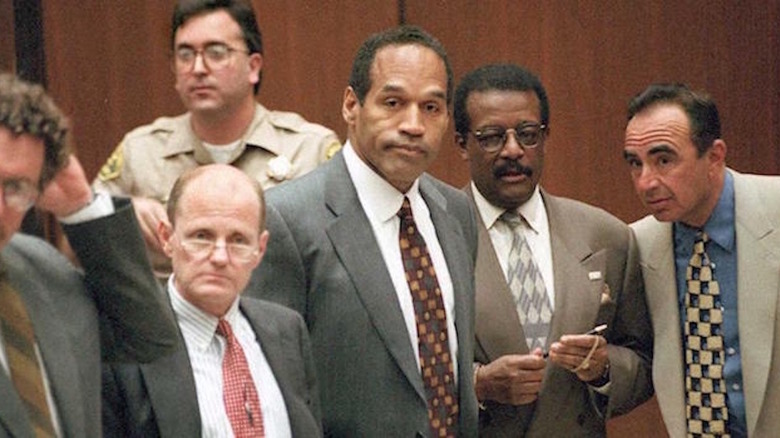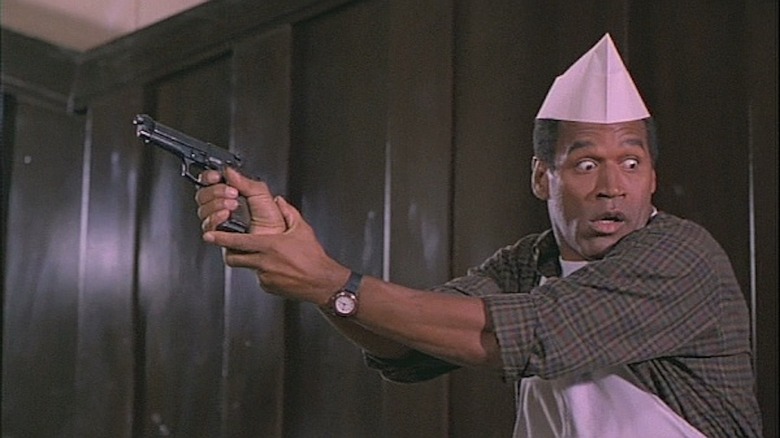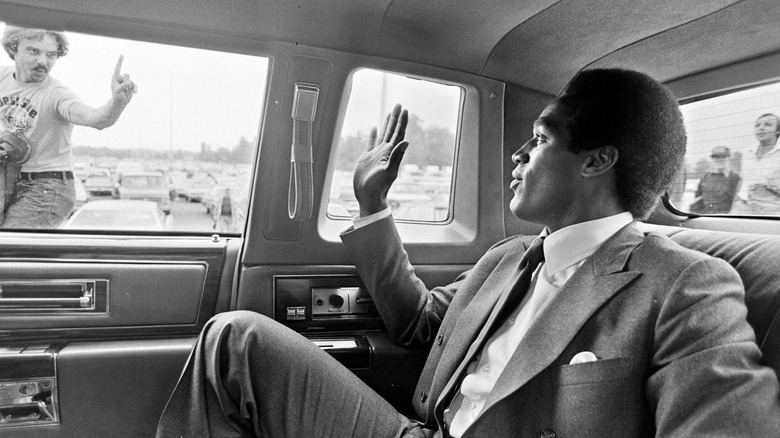The Best Documentary About OJ Simpson Is Now On Netflix
One of America's strangest celebrity sagas came to an abrupt, anticlimactic close when O.J. Simpson died at the age of 76 on April 10, 2024. The Heisman Trophy-winning running back from the University of Southern California became a professional football phenomenon during his 11-season tenure with the Buffalo Bills. He was blindingly handsome and charismatic, as comfortable in front of a camera as he was breaking tackles on the gridiron. Unlike Jim Brown, Simpson chose to keep playing football when he embarked on his acting career; and though Simpson was typically cast in supporting roles, they were often high-profile productions (namely the Best Picture-nominated "The Towering Inferno" and the Emmy-winning miniseries "Roots").
When Simpson retired, he continued to act while staying close to football as an on-field reporter for NBC. You never knew where The Juice was going to turn up, but you were never unhappy to see him. This was especially true when he was cast as Detective Nordberg opposite Leslie Nielsen's bumbling Lieutenant Frank Drebin in "The Naked Gun" movies. Simpson, so graceful on the football field and suave on the sidelines, was a natural at physical comedy (credit the ZAZ team behind classics like "Airplane!" and "Top Secret!" for understanding this). We weren't used to seeing this high-wattage superstar play a hard-luck oaf, and it just made us love him more.
So when he was accused of brutally murdering his wife Nicole Brown Simpson and waiter Ron Goldman, and subsequently led the Los Angeles Police Department on a wild, nationally televised car chase, those of us who grew up admiring Simpson for his rushing prowess and enjoyed his innocuous public persona found ourselves in a state of disbelief. The next 30 years of his life would be a funhouse mirror fall from grace. It is hard to make sense of this journey, but one documentary, currently available to stream on Netflix, does it with stunning clarity.
'I'm not Black, I'm O.J.'
Ezra Edelman's 467-minute "O.J.: Made in America" was made for ESPN's non-fiction series "30 for 30," but received brief theatrical runs in New York City and Los Angeles, thus qualifying it for the Academy Awards' Best Documentary Oscar. It deservedly won the trophy, even though some scoffed that it was really a miniseries (and the Academy has ensured that this will never happen again).
You can be the judge of that when you check it out on Netflix, which, even if you think you're not interested in this sordid saga, you absolutely should. Edelman's film is utterly captivating. The first half charts Simpson's rise to sports and media prominence, which is especially essential for people who weren't around for that part of his career. Edelman adroitly demonstrates how Simpson seduced an entire nation. Unlike Muhammad Ali, Kareem Abdul-Jabbar, and Jim Brown, Simpson wasn't political. He viewed himself as post-racial. "I'm not Black," he's quoted as saying in the documentary, "I'm O.J."
The second half peels away Simpson's layers, bringing us to the sociopathic core of a man who believed himself above the law because he was too damn charming to get caught. And he was right, at least to a certain extent. Despite an avalanche of damning circumstantial evidence, Simpson was acquitted of murder. He was found liable during a civil trial, but this has always felt like a footnote in the Simpson story. He was still free, and he made sure we couldn't ignore him.
O.J. died a victim in his own mind
When you take the plunge into "O.J.: Made in America," make sure you've carved out a whole day because you're going to want to watch it all in one sitting. The trajectory of Simpson's story may be familiar, but the details are beyond bizarre. Once he becomes a semi-pariah, the hangers-on become sleazier and dumber, and they indulge his every errant fancy in the hopes of making a quick buck off his notoriety. And the worse it gets for O.J., the more he insists that he's the victim.
The most remarkable aspect of Edelman's documentary is that it isn't just about Simpson. It's about America, and how a celebrity athlete can so completely distort our notions of race, morality, and justice. The film was released in 2016, so it excludes the pathetic final years of Simpson's life. I kind of wish Edelman would make a coda that deals with Simpson's post-parole years (he eventually served nine years in prison for armed robbery and kidnapping that were unrelated to the Brown-Goldman murders), where he embraced social media and held forth on the issues of the day as if he were still the guy who deftly bantered with Bob Costas every Sunday during football season.
Because the scary thing is that he was. He absolutely was still O.J. And when a friend texted me one of his videos, I would watch it through to the end in disbelief. If I'd run into Simpson at a restaurant, and he shot out his hand, I'm not sure how I would've reacted. Despite everything, he was still O.J., and, frustratingly, up until the day he died, I couldn't shake that.


